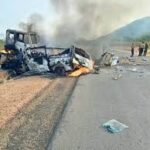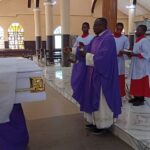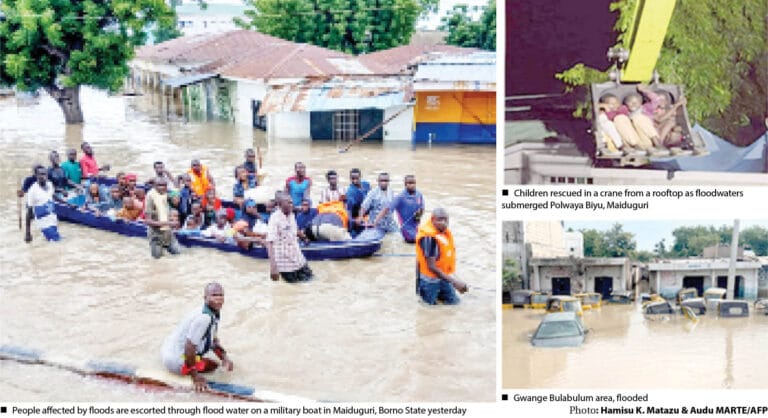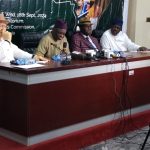Survivors of the Maiduguri flood, the worst in three decades, have narrated their harrowing experiences before they were rescued.
The heavy rainfall, which began Monday night had ruptured the Alau Dam in the outskirts of Maiduguri, the Borno State capital and flooded residential areas and public buildings, including hospitals and schools.
Those taken to safety thanked God for saving their lives, but said many families are still trapped in hard to reach locations.
Our correspondents report that search and rescue teams have intensified operations at various locations as the flood waters continue to recede.
I can’t locate my wife, 5 kids– Survivor
Goni Ba Usman, who was crying profusely sat under a tree yesterday, saying his wife and five children were still missing.
“The last time I saw my wife and the kids was on Tuesday, around 6:30am. You are giving me water, how can I drink water when I have not seen my family since the flood struck?” he told rescue workers at one of the IDP camps.
“I am finished. We went to the Babagana Wakil Camp, but we couldn’t find them. I saw some of my neighbours there but I couldn’t find my family.
“Innalillahi Wa’inna Ilaihi Rajiun, (from Allah we came and to him is our return),” he kept repeating while people continued to give him hope that his family members are alive.
‘I left neighbours in dire situation’
Another victim, Abubakar Tijjani, who said he was rescued by the military, told the Daily Trust that he left behind other people in dire situation.
“As it is now, over 50 people including men, women, old and young that have been rescued are taking refuge in the house I also relocated to. The number keeps increasing as the rescue operations continue.
“With efforts of the military and others, we hope that more people would be rescued as the flood subsides.
“Right now, all the available resources with me and my family have been overstretched,” he said.
Another rescued person, Ahmed Jallo, said they left behind people in thirst and hunger.
“I never thought that I would make it alive; the water had swallowed my house,” he said.
“We couldn’t access drinking water; we broke into many shops and ate everything inside. At a point we were left with nothing to eat.
“Many people died and floated on the water with animals’ carcasses for days unattended.
“I thank God for saving my life, and the people that rescued us,” he said.
He said the flood had subsided in Gwazari and Ali Goshe, but the areas are still not habitable.
Jummai, a school teacher, said her parents were only rescued from their house around Gamboru after three days.
“Gladly, our house is an upstairs, therefore, the whole family relocated to the first floor. It was after two days that they were rescued,” she said.
‘I paid N100,000 for canoe operators to rescue my sheeps”
A woman, who did not give her name, whose residence located at the 505 Housing Units, along Dikwa Road, said she had to pay N100,000 for canoe operators to rescue her sheep from a flooded area.
“I was able to escape with my family before the flood took over the whole area. However, even though we have relocated to safety, I continued to feel guilty because I left my animals there. I had to pay canoe operators N100,000 to go and rescue them.
“From Muna Garage where we are now to the 505 Estate is a stone throw, but look at how some people are taking advantage of our plight to make money. May the Almighty restore amity in our Borno,” she said.
“I thought I would die with my six children’
The BBC reported that Fatima Yakubu could not believe that she and her six children are still alive after the dam collapsed following the torrential rains.
The family, who live south of the city of Maiduguri near the Alau Dam, were asleep when their house began filling with water in the early hours of Tuesday.
“I woke up at 1am when I felt water on my legs,” the 26-year-old told the BBC.
“It was rising very fast, and I was so scared. I thought I was going to die with my children,” she said. She cried out in panic for help: “Some men heard me screaming and came to rescue us. I am grateful to God.”
Along with her children she has found refuge at Bakassi Camp, one of four centres set up for the hundreds of thousands of people who have been flooded out of their homes this week.
Until last year, the camp was occupied by those who had fled Boko Haram militants, whose 15-year insurgency has caused havoc in a region where poverty is endemic.
The Borno state government had ordered schools that only recently reopened after a long holiday, to close for two weeks.
There are worries about an outbreak of waterborne diseases as most of the city’s network of sewers has collapsed, contaminating water sources.
The state governor, Babagana Zulum, had said that the floods might have affected up to a million people.
Hunger is now a major issue for those who have lost their belongings, homes and businesses.
Rescue operations ongoing
Daily Trust reports that rescue operations are still going on in Gamboru, Lagos Street, Abbaganaram, Gwange, Customs, Ferube, 505 Abbagana Terab Housing Estate and other hard to reach locations.
The Director -General, State Emergency Management Agency (SEMA), Dr Mohammed Barkindo, said that 3,164 persons were rescued from different locations in the city so far.
“We are trying our best to provide food and non-food items to those who are currently in the camps”, he said.
The acting Zonal Coordinator, North-East of the National Emergency Management Agency (NEMA), Surajo Garba, also said that military had deployed four speed boats to reinforce rescue operations. He said that the flood had subsided but hundreds of people were still trapped and stranded.
“We are working with SEMA, military and other stakeholders to rescue those trapped in some locations.
Also, the Executive Director, Network of Civil Society Organisations, Borno State, Comrade Bulama Abiso, lamented that the situation was overwhelming and requested that sub national governments should support the Borno State government.
“As you can see, people are trooping out from various locations and the camps they open are congested; over one million people have been displaced so far.
“We don’t have enough food and essential supplies at the camps. People are always rushing for food,” said Ms Yakubu, who is shouldering the responsibility for looking after her children as her husband is staying with his second wife.
“My kids shared just one plate of meal today. They are still hungry while I haven’t eaten,” she said.
259 dead, over 1m affected in 29 states – NEMA
NEMA said yesterday that the death toll from floods has risen to 259, with over one million people affected in 29 states of the federation.
The Director General of NEMA, Mrs. Zubaida Umar, said that flood disasters had also affected 1,048,312 people and displaced 625,239 between April and now.
During a National Emergency Coordination Forum meeting in Abuja, yesterday, Zubaida said that 172 local governments have been affected. She said that 2,390 people have been injured, 94,491 houses have been damaged, and 125,805 hectares of farmland have been destroyed.
“This occurrence aligns with the predictions in this year’s Annual Flood Outlook released by the Nigeria Hydrological Services Agency (NIHSA), which identified high-risk areas for flooding from July to September 2024, and from October to November,” she said.
She said that efforts were underway to activate Internally Displaced Persons (IDP) camps, deploy additional staff and equipment for search and rescue operations, and provide essential relief items.
“Plans are also in place to provide further relief interventions, including medical supplies, additional water purifiers, and support for evacuations and rehabilitation of displaced populations,” she said.
The Assistant Director of NEMA’s Search and Rescue Department, Mrs. Wagami Lydia Madu, said that in Maiduguri, 414,000 people have been affected, 389,000 displaced, and 37 lives lost. She added that 10 camps have been activated, with five currently housing displaced persons.
Head of the United Nations (UN) Office for the Coordination of Humanitarian Affairs (UN-OCHA), Mr. Trond Jensen, said that the organisation was providing cooked food, potable water, and working with the military to reach inaccessible areas. He also mentioned efforts to secure donor flexibility for flood response funding, with $6 million expected for the North East.
NGF visits affected areas, donates N100m; Fintiri N50m
The Nigeria Governors’ Forum (NGF) visited Borno State to express sympathy with the victims of the flood disaster and assess the damage caused by the floods in Maiduguri and Jere.
The delegation, led by the NGF Chairman, Governor Abdulahman Abdulrazak of Kwara, included Lagos Governor, Babajide Sanwa-Olu and Ondo Governor, Lucky Aiyedatiwa.
Abdulrazak emphasised the forum’s commitment to supporting Borno State and acknowledged the challenges faced by the affected communities.
“From what we saw in the media it is a natural disaster that we need to see ourselves.
“We know the hardship and challenges that people are going through and we have no doubt His Excellency (Governor Zulum) is up to the task in making sure he brings succour to the people and turns things around immediately,” he said.
Adamawa State Governor, Ahmadu Umaru Fintiri joined the tour and announced a donation of N50 million to flood victims in addition to six speed boats to support residents who still remain stranded get to dry ground.
Additionally, a member of the House of Representatives, Mukhtar Betara, donated N50 million to the victims.
In his response, Governor Zulum thanked the forum for the support and urged members to advocate for additional federal assistance. He described the flooding as unprecedented and called for increased support to address the crisis.
“Elderly people who are over 95 years old confessed that they have not seen such a magnitude of flooding in their lives,” he said. (Daily Trust)












